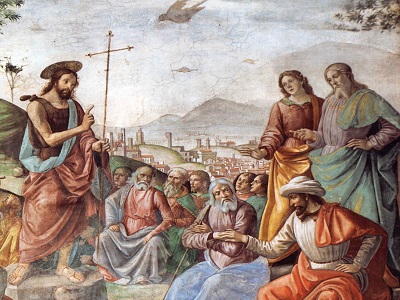
2nd Sunday of Ordinary Time
01-19-2020Weekly Reflection©2019 Liturgical Publications, Inc.On the cusp of fame, power, or influence, would you turn it down? Today's Gospel again features John the Baptist. Controversial but popular, John has gathered quite a group of followers. He has disciples. People come from near and far to be baptized by him. Pharisees and government leaders are drawn to his preaching. If John was another man, a lesser man, he would have claimed his own greatness. Instead, John the Baptist is a witness to humility.
"The next day he saw Jesus coming toward him and said, 'Behold the Lamb of God … he is the one of whom I said, "A man is coming after me who ranks ahead of me."… the reason why I came baptizing with water was that he might be made known.'" Rather than point to himself, John points to Christ. John could have grasped at what he had accumulated. He could have seen Jesus as a Messianic competitor. Instead, John knows who he is. He knows his place as forerunner. Because John knows who Jesus is. "I have seen and testified that he is the Son of God."
A life of humility, a life for others, can be challenging to live. So much of our culture is built around achievement and individualism. We can justify it, too, in pursuit of "greater goods" and higher ideals. In the process, however, we might miss our own participation in the kingdom of God. John, for all of his humility, was not an afterthought. In another Gospel passage, Jesus calls him "the greatest prophet," even the greatest of men. Why? Because he fulfills the mission given to him by God: to announce the coming of the Messiah. We too are prophets and forerunners. Our witness to the Gospel is meant to point people to Jesus. Consider your own mission this week. To whom are you called to announce the good news of the Son of God? n our baptism!
El anuncio profético de Juan Bautista continúa; el domingo pasado con la Fiesta del Bautismo del Señor él decía no merecer desatarle las correas de sus sandalias. Hoy, anuncia otra importante profecía: "Este es el Cordero de Dios, el que quita el pecado del mundo." Y el Evangelio continúa narrando la grandeza del Hijo de Dios por medio de Juan, quedando su testimonio hasta nuestros días: "Aquel sobre quien veas que baja y se posa el Espíritu Santo, ese es el que ha de bautizar con el Espíritu Santo." Juan rebela que Jesús es el Cordero de Dios que será sacrificado para el perdón de todos los pecados del mundo y que Él es Dios que bautizará con el Espíritu Santo. También el Evangelio revela dos cosas importantes sobre el Bautismo: el Bautismo con agua nos lava, limpia del pecado, el Bautismo con el Espíritu Santo nos ayuda a conocer íntimamente quien es Jesús. Los Sacramentos son misterios que nos ayudan a re- lacionarnos y conocer al Cordero de Dios.
La catequesis por aprender de la Liturgia de hoy es que el Bautismo no es un simple evento ritual que hacen los padres al bautizar a sus hijos. Sino que es el inicio de la jornada de toda la vida; es el proceso de conversión de cada bautizado. En la Eucaristía, afirmamos nuestra fe en el Cordero de Dios cuando el sacerdote dice, "Este es el Cordero de Dios, que quita el pecado del mundo. Dichosos los invitados a la cena del Señor." ¿Qué relación existe entre el Cordero de Dios y nuestro Bautismo?
BACK TO LIST